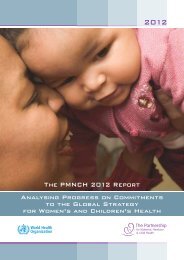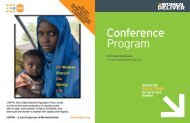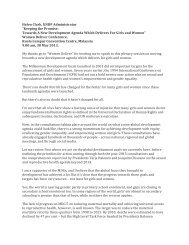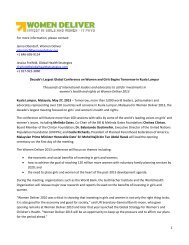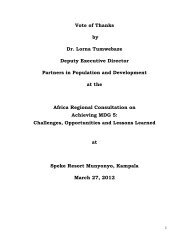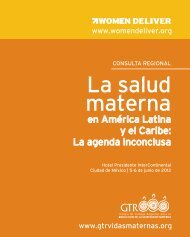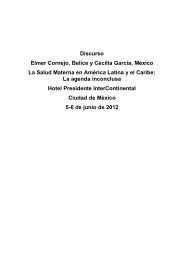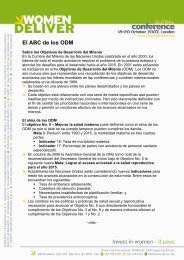State of World Population 2012 - UNFPA Haiti
State of World Population 2012 - UNFPA Haiti
State of World Population 2012 - UNFPA Haiti
You also want an ePaper? Increase the reach of your titles
YUMPU automatically turns print PDFs into web optimized ePapers that Google loves.
CASE STUDYExpanding family planning inhumanitarian settingsAs part <strong>of</strong> the emergency response in SouthSudan, <strong>UNFPA</strong> delivered supplies for oraland injectable contraception and insertion <strong>of</strong>intrauterine devices and other family planningcommodities (United Nations <strong>Population</strong>Fund, 2011a). And in collaboration withthe American Refugee Committee, <strong>UNFPA</strong>contributed to training health care workers,community distribution workers and peereducators on family planning.Strategies and programmes <strong>of</strong>ten fail to fulfilthe family planning needs <strong>of</strong> refugees and internallydisplaced populations who take refuge awayfrom home for varying lengths <strong>of</strong> time. A focuson the emergency provision <strong>of</strong> shelter, food, andbasic health services has not always includedtargeted programming to deliver essential reproductivehealth information and services. In recentyears however, humanitarian inter-agencyworking groups have developed resources andtools to help humanitarian personnel generatedemand for family planning and ensure refugees’right to family planning is met.Sex workers. Sex workers not only have a rightto time and space their children, but also to relyon condoms as a means <strong>of</strong> protecting themselvesfrom sexually transmitted infections includingHIV. However, sex workers <strong>of</strong>ten face socialstigma and discrimination, which subsequentlyinhibit them from accessing family planninginformation and services (Lin, 2007).Social norms <strong>of</strong>ten classify sex work as beingimmoral, and the institutions and individualsresponsible for law enforcement and healthmay reinforce discriminatory attitudes and practices,with harmful effects on sex workers. Forexample, in some countries such as Lebanonand the Philippines, stigma against sex work andnon-marital sex has been used to pass legislationthat prevents people from freely possessingcondoms (Human Rights Watch, 2004; <strong>World</strong>Health Organization, 2005). As a result, sexworkers <strong>of</strong>ten perceive that health systemsare non-responsive to their needs, includingdenying them access to the full range <strong>of</strong>available contraceptives.Studies affirm that when sex workers accessfamily planning services, they <strong>of</strong>ten do so reluctantlyand fall victim to the biases <strong>of</strong> health-careworkers who neglect their sexual and reproductivehealth needs, focusing primarily on the risk<strong>of</strong> HIV and sexually transmitted infections (Lin,2007; Human Rights Watch, 2004). There aredocumented cases <strong>of</strong> providers in South Asia andSouth East Asia being accused <strong>of</strong> exposing HIVstatuses and threatening to report those withHIV to the authorities (Mgbako et al., 2008).The consequences <strong>of</strong> the stigmatization <strong>of</strong>sex workers violate universal human rights.According to the <strong>World</strong> Health Organization,“interventions to promote safer sex among sexworkers must be part <strong>of</strong> an overall effort toensure their safety, promote their health andwell-being more broadly and protect their humanrights” (<strong>World</strong> Health Organization, 2005).Lesbian, gay, bisexual and transgenderedpeople. <strong>State</strong>-run family planning programmeslargely neglect the needs <strong>of</strong> those who identifythemselves as lesbian, gay, bisexual andtransgendered. The United Nations HighCommissioner for Human Rights has affirmedthat, “discrimination on the basis <strong>of</strong> sexualorientation is contrary to international humanrights law” (United Nations High Commissionerfor Human Rights, 2008). However, in mostplaces it is heterosexuals who are privileged in64 CHAPTER 3: CHALLENGES IN EXTENDING ACCESS TO EVERYONE




